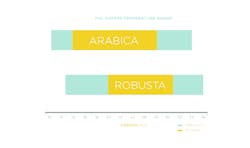Wednesday, March 18, 2015 —Intelligent Coffee Insights releases additional information regarding the Arabica crop in its Arabica Report Data Release, a supplement to its recently published "Climate of Coffee 2015" report.
The Arabica Report Data Release includes:
- Explanation of the correlation between climate and Arabica production. The productivity of Arabica is affected by temperature, and average temperatures over land have climbed 1 degree C since the 1970’s. 2014 was the hottest year on record, with Brazil experiencing a disproportionately strong rise in temperature.
- Commercial viability of Arabica coffee production. High temperatures are not lethal to coffee trees, but will affect production.
- Graphs detailing optimal, suboptimal and unviable temperatures, as well as daily temperature ranges from 1995 to 2014 in two key Arabica growing regions.
According to the Food and Agriculture Organization (FAO), the growth rate of coffee trees drops off at temperatures above 28°C for Arabica, and above 30°C for Robusta. They suggest that at temperatures above 34°C for Arabica trees and above 36°C for Robusta trees, growth falls to an unviable rate for commercial production. This commercial viability is key. High temperatures during parts of the day are generally not lethal to coffee trees. However, productivity is affected; the trees choose to spend energy on vegetative growth rather than reproductive growth in order to survive. Higher temperatures for longer periods having an even stronger effect.
But what does this all mean to coffee production? Taking the FAO temperature thresholds as a guide, the charts above show daily temperatures throughout the whole year, and at what temperatures Arabica and Conilon production is optimal, possible and unviable. Compare the years 1995 and 2014.
Intelligent Coffee Insights, a research firm, recently released an unprecedented Industry Research Report analyzing the future Brazil coffee crop as a window into understanding future coffee price fluctuations worldwide. The full report, available via subscription, includes a detailed analysis of Intelligent Coffee Insight’s on-the-ground findings as well as all of the raw data they collected, something that has never before been done in the coffee industry.





